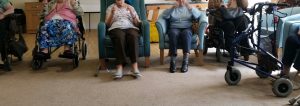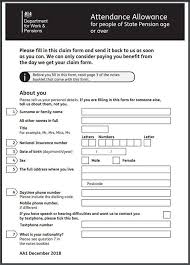Taking advantage of the benefits of ageing
Healthy ageing does not usually depend on having a lot of money, but every little bit helps. Therefore, I continue to be alarmed at the number of people of pensionable age who are completely unaware of the social security benefits to which they are entitled. Equally troubling is that even when they are made aware, the perceived stigma of receiving benefits is off-putting. Difficulties in navigating the social security system and claiming often result in benefits to which people are entitled going unclaimed. This blog explores why many people do not claim Attendance Allowance, why claiming could bring additional support for them and their carers, and how they might go about claiming.
Attendance Allowance (AA)
Each year, thousands of older people entitled to Attendance Allowance fail to claim it.
AA is a social security benefit in England, Wales, Scotland and Northern Ireland for people with a disability who have reached pensionable age and are in need of help.
Financial security is highlighted by Public Health England as one of the cornerstones of productive ageing. Many older people – who are often struggling physically, mentally and financially – remain unaware of AA’s existence and the benefits it could bring them and their families.
AA is paid at two rates and depend on the level and frequency of care the recipient needs throughout the day and night. Currently, the lower rate stands at 58.70 per week and the higher rate at £87.65 per week.
Can you afford to miss out on claiming £3052.40 or £4557.80 each year to help with your personal care?
Why are people not claiming AA?
Many older people are reluctant to own up to the fact they need assistance even when they face significant struggles in their day-to-day care.
The government website states that
‘Attendance Allowance helps with extra costs if you have a disability severe enough that you need someone to help look after you.’
Receipt of Attendance Allowance could also be the trigger for qualification to other benefits such as Carer’s Allowance.
Although application for AA does not require you to declare personal savings, some older people feel this is something they might need to do. Hence, the prospect of having to answer intrusive financial questions deters many from claiming.
Attendance Allowance is not means-tested and earnings and savings are not assessed.
Nevertheless, completion of the AA form requires the inclusion of a wide range of personal and sometimes sensitive information that many people are reluctant to share, such as help needed with incontinence. Moreover, some older people perceive claiming benefits as equivalent to begging. The requirement to complete and submit a 48-page self-assessment may also add to this discomfort.
How do you qualify for AA?

Older people with a range of care needs – Do they need help or supervision?
The need for “help” and “supervision”, precisely defined, are what determine qualification for AA… In outline, if you need help to wash, dress, eat, toileting and to make yourself understood, then this could be assessed as attention. Supervision means that you may need someone to help to keep you safe in taking medicines, controlling your behaviour, avoiding danger to yourself or others and watching over.
Many people do not consider themselves disabled. However, it is important to consider that you consider the help that you need from another person for your personal care and safety. These are factors that could support a claim.
Accessing the Attendance Allowance form
Anyone with internet access can access information at the GOV.UK site. However, if older people have limited access to computing and/or have difficulty navigating the technology, help is available. If friends or relatives are unable to assist, external agencies may be able to offer free guidance.
 Attendance Allowance Form
Attendance Allowance Form
The Attendance Allowance claim form may be completed and saved online .It can also be downloaded, completed, printed and then forwarded by post.
Where to get help to complete the AA form
The Citizen Advice Bureau and charitable organisations such as AgeUK offer excellent advice. I am aware from personal experience that the help people need requires supportive, non-judgemental and sensitive questioning to elicit the appropriate responses. For example, managing incontinence for an older person can be among the most demeaning and embarrassing issues to talk about, yet, it could be one of the most significant factors impacting on their care. Similarly, falls and stumbles are often viewed as a ‘normal’ part of ageing.
However, a word of warning: make time to complete the form as it could take hours rather than minutes! Having your prescriptions, GP’s name and address and personal medical information to hand will make completion of the application much speedier. And remember, do not be afraid to give the personal health information requested. A positive outcome could depend on overcoming the embarrassment of admitting personal care needs.
Finally, remember that just because you can carry out an activity does not mean that you do not need help. If that activity takes an inordinate amount of time, leaves you exhausted and threatens your health, AA to support you while carrying it out could make the difference in improving your well-being.
